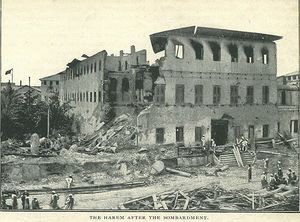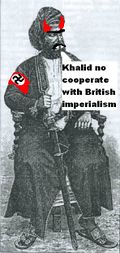Anglo-Zanzibar War
| Anglo-Zanzibar War | |||||||
|---|---|---|---|---|---|---|---|
 The one building left standing after the war |
|||||||
|
|||||||
| Belligerents | |||||||
| Commanders and leaders | |||||||
| Strength | |||||||
| 1,000 troops
5 | 2,800 A small rowboat |
||||||
| Casualties and losses | |||||||
| None | Everyone | ||||||
“PWN3D!!!1”
“WTFH4X!!!”
The Anglo-Zanzibar War (9:02 A.M. – 9:40 A.M. August 27, 1896) was a war fought between the United Kingdom and the island country of Zanzibar for the safety and preservation of Western Civilization, and to liberate the small, African country from the clutches of their Sultan dictator, Khalid bin Laden Hashish Al-Busaid, who had fortunately been in power for only two days, which was not enough time for him to begin his reign of terror. Despite being the shortest war in recorded history (beating the previous record held by France), the Anglo-Zanzibar War was one of the most significant wars that took place during the turn of the century. In fact, it is considered to be the most important 38 minutes, four and a half seconds in modern history.
Leading to War[edit | edit source]
Tension between the United Kingdom and Zanzibar began to emerge on Tuesday, August 25, 1896. Since March 5, 1893, Sultan Sayyid Hamad bin Thuwaini Al-Busaid (Arabic: حميد بن ثويني البوسعيد), Knight Grand Commander of the Order of the Star of India, had ruled Zanzibar, willingly cooperating with the British colonial administration. But on August 25, حميد بن ثويني البوسعيد, Sayyid Hamad bin Thuwaini Al-Busaid, fifth Sultan of Zanzibar, suddenly died. No one knows how or why. He had simply died sometime, and was found still dead sometime after, more than likely remaining dead during the time between his death and the discovery of his dead body on August 25, 1896. However, it is known for certain that Khalid bin Barg Hashish Al-Busaid might possibly have been involved in killing him.

Upon the discovery of Hamad's death, his nephew, Sayyid Khalid bin Barg Hashish Al-Busaid (Arabic: خالد بن برغش البوسعيد) seized power with what wasn't quite a coup d'état, but more of a simple declaration that he (that is, Sayyid Khalid bin Barg Hashish Al-Busaid) was to be sultan dictator, although it was still technically a coup d'état.
Hamoud bin Mohammed (who didn't have quite a fancy name as Khalid bin Barg Hashish Al-Busaid, and thus was a friend to Western Civilization) had also heard of the death of the sultan, but by the time he reached the palace, Khalid had already taken over and declared himself sultan.
The British, who had favored instead Hamoud bin Mohammed because they thought he was much cooler than Khalid bin Barghashish Al-Busaid, issued an ultimatum a day later, on August 26, at 8:00 A.M. for Khalid to abdicate the throne and leave the palace within a day and an hour. Khalid refused. Instead, he gathered an army of 2,800 men and the still-dead sultan's rowboat armed yacht. Sources also showed he thought about launching a program to create the first nuclear weapons, which Zanzibar might have had the capabilities to complete within a mere millenium. The British, in reaction to Khalid's clear desire to destroy Great Britain, assembled five warships, commanded by Admiral Rawlings, and also landed parties of Royal Marines to support the loyalist regular army of Zanzibar.
The War Breaks Out[edit | edit source]
When the sun rose on August 27, the British stood at their posts, ready to deal an ass-whooping to the inferior people of Zanzibar. Several minutes before 9:00 A.M., Khalid began begging a United States representative on the island for peace and mercy. The American said in defiance the immortal words, "For the last time, I'm not British!"
At 9:02 A.M., the first shots were fired. The war had begun. The bombardment was directed first at the palace, but then Admiral Rawlings noticed that a tiny rowboat armed warship was firing at one of the boats. He ordered that all bomb the rowboat massive battleship. It, however, did not sink easily. The five ships fired at the rowboat armored super death cruiser for about thirty minutes before it finally sank. But, due this to quick strategic thinking on the Admiral's part, the war was shortened by as much as twelve seconds. The palace again became the target of the British fleet as they resumed their bombardment. Eight minutes later, the smoke cleared enough for the British to discover that the city was now a giant crater. They ceased fire and, as quickly as it had begun, the war was over.
Aftermath[edit | edit source]
Shortly after the war ended, Khalid bin Barghashish Al-Busaid fled to the nearest German establishment, where he was kept in safety. Great Britain demanded his return so that they could perform the common ritual of chopping the head off of the loser. This tactic of demanding, of course, only worked with pussies like the French or the Swiss, so Germany refused. The British, determined not to let the evil mastermind escape their grasp, did absolutely nothing further. A month after the war, Khalid fled by boat to Dar es Salaam, Tanzania, where he remained a pussy and hid for the rest of his life. Hamoud bin Mohammed was elected by the Queen of Great Britain to be the free democratic leader of what remained of Zanzibar. In the spirit of a free democracy, he decided to keep this position for the rest of his life.
As a final act, Britain demanded payment from the Zanzibar government as compensation for the shells fired on the country.
